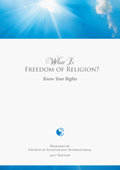Human rights law prohibits discrimination based upon an employee’s religious belief. This discrimination applies not only to hiring and firing, but to all terms, conditions and privileges of employment. [26]
Direct discrimination involves less favorable treatment on grounds of religion or belief. Factual examples are where an employer refuses to employ individuals associated with a particular religion or requires all prospective employees to attest that they are not part of a particular religion.
Indirect discrimination occurs where a seemingly neutral provision or practice would put members of a particular faith at a disadvantage unless the disadvantage can be justified. Factual examples are when male employees are required to be clean shaven, which could discriminate against Sikh men.
Full respect for religious autonomy involves the recognition that individuals have the right to manifest their religion in their private lives by volunteering in their religious community by engaging in missionary activity or other services that advance the religious mission of their community. [27]
[26] Universal Declaration of Human Rights, Article 18; International Covenant on Civil and Political Rights, Article 18; European Convention on Human Rights, Article 9; EU Employment Equality Directive; International Labor Organization Convention No. 111.
[27] Jehovah’s Witnesses of Moscow v. Russia ¶ 120-121 (App. 302/02), 10 June 2010.




























